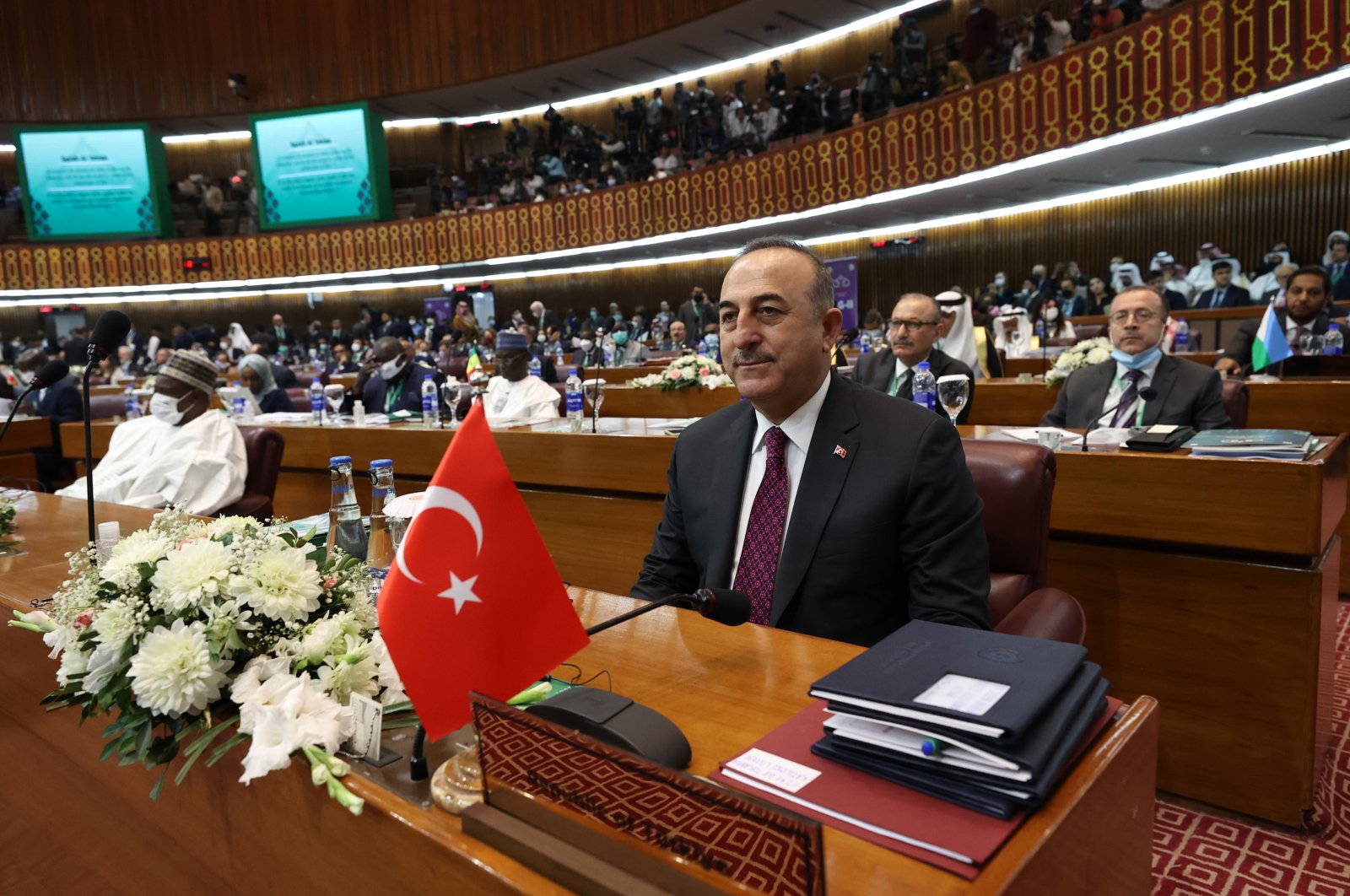
The war in Ukraine has revealed the international community's double standards, Foreign Minister Mevlüt Çavuşoğlu said Tuesday.
While addressing the 48th session of the Organisation of Islamic Cooperation (OIC) Foreign Ministers' Conference in the Pakistani capital Islamabad, Çavuşoğlu said: "We heard those saying 'This is not the Middle East, this is not Afghanistan. Why is blood spilled?' For us, the blood spilled in Kharkiv and the blood spilled in Aleppo are equal."
The top diplomat also reiterated the need to adopt a common stance against the challenges that the Muslim world faces.
"The theme of our meeting is 'Partnership for Unity, Justice and Development.' This theme should not be just a slogan, it should be filled with concrete steps. Because we only succeed when we are united," he said.
Çavuşoğlu also called on the Muslim world to question itself. "The 14 centuries-old culture, art, civilization, science and wisdom of Islam are waiting to be rediscovered. The classical centers of our civilizations, such as Jerusalem, Damascus, Aleppo and Kabul were destroyed. They lost their identity. The names of many Islamic countries became associated with war, terror, suffering and massacres," he said.
Underlining that Muslim Turks, who have been in Western Thrace for seven centuries and in Cyprus for five, are deprived of their basic rights in the 21st century, Çavuşoğlu said: "The fundamental rights of our brothers and sisters in Kashmir are being violated. Islamophobia is on the rise in Europe. In China, Uyghur Turks and other Muslims face difficulties in protecting their religious rights and cultural identities. The headscarf right is denied in India, one of the countries hosting the highest number of Muslims. The Rohingya no longer even attract the attention of the world. Brotherly blood continues to flow in Libya, Syria and Yemen."
Stating that one should not blame others for the situation in the Islamic world, Çavuşoğlu said: "It is easiest to blame others. So what does that change? What can we change by blaming others? We must first call ourselves to account ... We say let's use our good relations to improve the situation of Muslim societies. As the Organisation of Islamic Cooperation, we know that we all exist for our common cause. Its duty is to be the common voice of the Islamic world in these cases."
On the sidelines of the meeting, Çavuşoğlu also held face-to-face meetings to discuss bilateral ties and regional issues with top diplomats of various countries including Turkmenistan, Thailand, Guinea and the Turkish Republic of Northern Cyprus (TRNC).
Call from Pakistan
Pakistan's Prime Minister Imran Khan also called upon the OIC and China to "step in" and "mediate" between Russia and Ukraine to stop the ongoing war.
"We are all worried about what's going on there. May I suggest that during their discussions, the foreign ministers, we should think about how we can mediate? How we can bring about a cease-fire, and put an end to the conflict," Khan said.
"I'm going to meet His Excellency Wang Yi (Chinese Foreign Minister) after this (summit) and I want to discuss how they (OIC) along with China can all step in and try to stop this (war)," Khan went on to say.
"This conflict, which is going to have – if it keeps going the way it is – it will have great consequences for the rest of the world ... We are already suffering. Oil prices have gone up. Gas prices have shot up, wheat prices have gone up because of this war," he said. He further warned that if the war continues "this is only going to get worse."
"So, therefore ... all the countries which are non-partisan ... we are in a special position to be able to influence this conflict," he added.
Voicing concern over the growing phenomenon of Islamophobia and attacks on Muslims, the premier lamented that the Muslim world has failed to counter this "wrong narrative."
"Where did this Islamophobia grow and was allowed to keep growing after 9/11? What happened after 9/11? Unfortunately, this narrative of Islamic terrorism, Islamic radicalization, radicalism. This narrative went on unchecked," he said.
"I'm sorry to say that we the Muslim countries did not do anything to check this wrong narrative. How can any religion have anything to do with terrorism? How was Islam equated to terrorism?" he said.
"Unfortunately, what should have been done – and wasn't – was (that) the heads of Muslim countries should have taken a stand on this. But instead, a lot of heads of state kept saying things like 'well, we are moderate,'" he went on to say.
"And guess who suffered? Muslims living in Western countries. They kept suffering because any incident would happen. Any terrorist incident by a Muslim immediately meant that every Muslim became branded," he said.
Khan contended that the Muslim world has failed the people of Palestine and Kashmir.
"We are not talking about conquering some country, we (are) simply talking about the human rights of Palestinians and Kashmiris," he said.
Khan urged the OIC and the international community to jointly work to "stabilize" Afghanistan.
"No nation has suffered as the people of Afghanistan have by 40 years of conflict," he said, calling for the withdrawal of sanctions on the Taliban government.
This, he opined, is the only way to stop "international terrorism" from Afghan soil.
